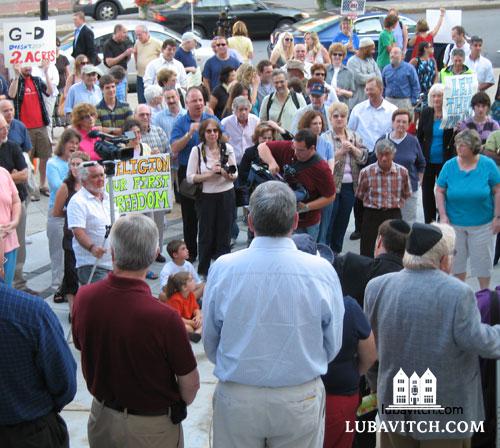(lubavitch.com) Faced with an outpouring of support from a very diverse group, Maine’s zoning board reversed its decision to prohibit a Chabad rabbi from hosting prayer services in his home at a hearing late Thursday night.
The 5-0 decision delighted the 200 people of all faiths who gathered at rally led by the Maine Civil Liberties Union in support of Chabad Lubavitch of Portland’s Rabbi Moshe Wilansky an hour before the zoning board began the hearing. Over thirty pastors and priests joined rabbis from local synagogues and leaders of the local Jewish Community Center, Jewish Federation and the Muslim community at the peaceful rally in front of city hall.
Standing outside of City Hall, Rabbi Wilansky addressed the rally. “Tonight people of all faiths and beliefs, have joined together for freedom of religion and all that is American,” said Rabbi Wilansky, “to ensure that all are treated equally and with dignity.”
Rabbi Wilansky, Chabad’s representative in Portland, ME, has been welcoming a group of fifteen worshippers in his home on the Jewish Sabbath and holidays for the last fifteen years. This past May, a member of the zoning board hand delivered a letter that stated the services violated local zoning codes. According to city documents provided to the group’s attorney, the decision was based on a single telephone complaint to City Hall.
MCLU counsel Zachary Heiden told Lubavitch.com: “Our mission is to protect the constitutional rights of individuals. One of the most important rights is the freedom to practice religion without government interference. In this case we feel the government has interfered” with Rabbi Wilansky’s right to worship.
To show support for religious freedom, Rabbi Alice Dubinsky sent notices out to her congregation at Temple Bet Ha’Am in south Portland, expressing hopes that one hundred families from the temple membership would attend.
“Numerous mainstream Portland churches advertise Bible study groups, women’s groups and church services in private homes. These are just as much ‘open to the public’ as Rabbi Wilansky’s Sabbath services,” wrote Phyllis Leeke, a Portland resident, in a letter that appeared in The Forecaster, a local newspaper. “The city doesn’t take action against landlords about noise and loud parties until after numerous complaints. Who made the decision to jump on Rabbi Wilansky after only one complaint?”
According to information received by Chabad’s attorney Marshall Tinkle, the board’s complaint stems from the number of parking spaces on the street occupied by those who join Rabbi Wilansky at the services and the website where service times are posted.
“Concerns about parking on the street and about a website inviting coreligionists to pray are not cause to infringe upon the First Amendment,” Tinkle said.

Be the first to write a comment.